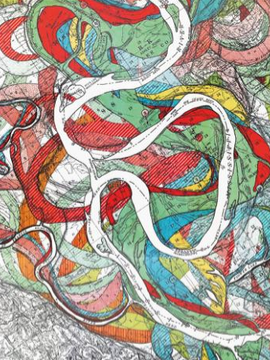This second research area addresses questions of relevance for a historical epistemology of Anthropocene-related practice fields, such as (pre-)industrial chemistry, Earth system and climate sciences, risk assessment, historiography, and the current transformation of scholarship.

Projects
-
 Geoanthropology
GeoanthropologyJÜRGEN RENN | GIULIA RISPOLI | CHRISTOPH ROSOL | BENJAMIN STEININGER | THOMAS TURNBULL | ROBERT SCHLÖGL | Cooperation Partners: Max Planck Institute for Chemical Energy Conversion (MPICEC)
The Anthropocene reveals a newly emerging necessity to orient intellectual comprehension, scientific research, and political action towards the behavior of inter-operational systems and the temporal processes that underlie them. In a series of international conferences, workshops, and joint writings our group discusses the intellectual challenges, methodological frameworks, and historical lineages of such a research endeavor, working together with experts from various fields such as climate and Earth system science, systems ecology, environmental history and environmental humanities, economics, law, anthropology, and political ecology.
-
 Anthropogenic Markers: Historical and Material Contexts of a Twentieth-Century Transition in Earthly Matters
Anthropogenic Markers: Historical and Material Contexts of a Twentieth-Century Transition in Earthly MattersGIULIA RISPOLI | CHRISTOPH ROSOL | Cooperation Partners: HAUS DER KULTUREN DER WELT (HKW) | ANTHROPOCENE WORKING GROUP (AWG)
From 2020 to 2022, the Anthropocene Working Group (AWG) is coordinating a series of geological investigations to identify key anthropogenic signatures for the onset of a new human-led epoch: the Anthropocene. As the group assesses the material evidence for a globally synchronous and lasting impact of human activities on physical, chemical, and biological conditions within the Earth system, it reconnects the debate on the Anthropocene to its actual chronostratigraphic meaning.
-
 History of Earth System Science
History of Earth System ScienceURSULA KLEIN
In the late eighteenth century, large-scale Earth systems such as the atmosphere and the earth’s crust became objects of systematic scientific inquiry. From early on, scientists also raised the question of whether human activities disturb such systems causing unintended effects. This geoanthropological project studies the history of public debates and systematic research about large-scale Earth systems and the biogeochemical effects of anthropogenetic interventions into such systems, covering the period from the late eighteenth century until today.
-
 Symbiotic Knowledge: The Biology and Philosophy of Cohabitation in the Anthropocene
Symbiotic Knowledge: The Biology and Philosophy of Cohabitation in the AnthropoceneSALOME RODECK | Cooperation Partners: Early Research Fund offered by the Research Institute for Culture, Cognition, History and Heritage (CLUE+)
Starting from the growing popularity of symbiosis as a way of rethinking planetary life, this project traces this development through the complex intertwinement of cultural and scientific imaginaries. My analysis follows symbiosis-as-discourse from its mid-nineteenth century inception and initial marginalization to its popularization in the 1970s and 1980s and recent proliferation in both the life sciences and the humanities.
-
 Tracing the Earth System Before Earth-system Science
Tracing the Earth System Before Earth-system ScienceGIULIA RISPOLI
My project will approach the Anthropocene by following the still neglected path of the Russian and Soviet tradition in global ecology and earth-system theory from the end of the nineteenth until the late twentieth century. The development of a science of the biosphere in Russia is largely the result of a prominent intellectual tradition characterized by unique conceptions of the Earth, space, time, and planetary boundaries. This tradition made possible the development of a distinctive systemic approach to geology, ecology, and energetics that will pave the ground for further elaboration on the deep historical and planetary role of life on Earth.
-
 History and Epistemology of the (Paleo-)Climate Sciences
History and Epistemology of the (Paleo-)Climate SciencesCHRISTOPH ROSOL
Being a peculiar (and largely unacknowledged) scientific practice at the border between an empirical and an exact science, paleoclimatology plays a key role in assessing the boundary conditions of the global climate's future. The aim of this project is to study the historical lineage and peculiar epistemic configuration of empirical data, computer models, and numerical simulation experiments within the climate sciences, and paleoclimatology in particular.
-
 Anthropocene Curriculum
Anthropocene CurriculumCHRISTOPH ROSOL | JÜRGEN RENN | Cooperation Partners: Haus der Kulturen der Welt (HKW)
The Anthropocene Curriculum is an initiative by MPIWG and HKW that explores pathways towards a novel transdisciplinary culture of knowledge production and education that is adequate to the predicaments of the Anthropocene. The project asks how knowledge production can be attuned to transdisciplinary and translocal methodologies that link insights of the natural and humanist sciences with other knowledge forms and practices.
-
 Past Projects
Past Projects2017–2019 | Julia Mariko Jacoby
Disaster Preparedness in Japan and Global Transfer of Knowledge 1890–1970
2016–2017 | Scott Gabriel Knowles
Disaster Research and Preparedness and Global Transfer of Knowledge
2016–2017 | Jürgen Renn | Christoph Rosol | Sara Nelson
Perspectives on the Technosphere
2017–2019 | Ursula Klein
Scientific and Technological Expertise in Industrial Europe
2016–2017 | Masahiro Terada
The Anthropocene Discourse as Historical Narrative
2007–2015 | Ursula Klein
"Useful Sciences," State Bureaucracy, and Industrialization in Prussia


